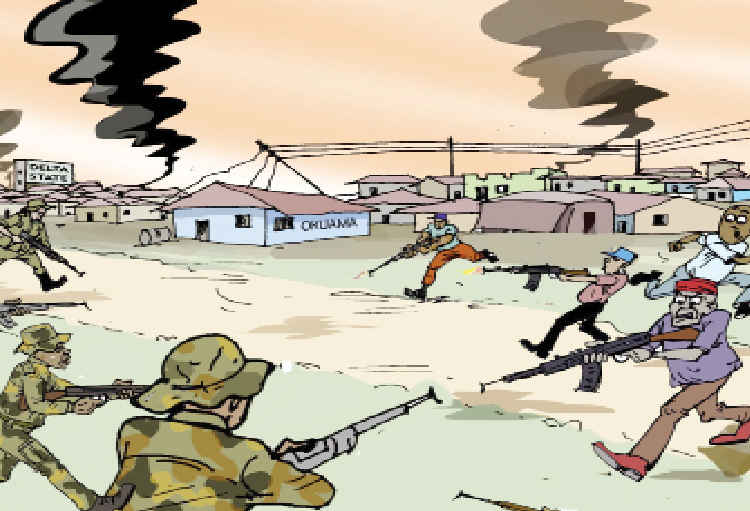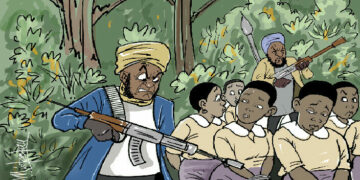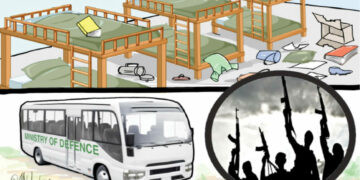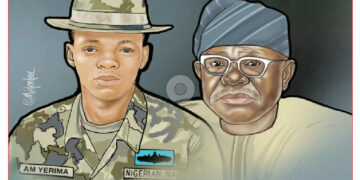The killing of seventeen officers and soldiers by irate youths in Delta State and the subsequent reactions that have trailed the gory act so far, especially as they pertain to allegations of reprisal attacks by the military, reminds me of Fyodor Dostoevsky’s novel, ‘Crime and Punishment’.
This novel by the Russian author published in 1866 tells the story of the mental anguish and moral dilemmas of Rodion Raskolnikov, an impoverished ex-student in Saint Petersburg who plans to kill an old woman storing money and valuable objects in her flat.
Raskolnikov thinks that with the money he could liberate himself from poverty and go on to perform great deeds. He convinces himself that certain crimes are justifiable if they are committed in order to remove obstacles to the higher goals of ‘extraordinary’ men.
As with most crimes, with the deed done, Raskolnikov finds himself enmeshed in confusion, fear and aversion. His theoretical justifications lose all their power as he struggles with guilt and horror. He is confronted with both internal and external consequences of his deed.
Like Raskolnikov, there is no contesting the fact that the youths in Okuama community of Ughelli South local government area of Delta State and all the elders who supported their action, whether overtly or covertly, are now struggling with the consequences of their action. It is more so that PBAT’s directive has given the military full authority to go after the culprits.
Even if it was a war scenario, there are no civilians on the battlefield, only combatants and non-combatants. Any person, regardless of age or gender, who picks up a weapon and engages troops has categorized him/herself as a combatant and will be countered using whatever force is authorized under the rules of engagement.
Warning Ignored
Early this year, LEADERSHIP carried a report about an impending inter-communal clash between Ijaw-speaking Okoloba community in Bomadi local government area and Urhobo-speaking Okuama community in Ughelli South council area.
According to the report, Governor Sheriff Oborevwori was alerted of the incessant attacks and invasion of farmlands and fishing lakes that is at the heart of the crisis. What did the Delta state government do to mitigate the crisis?
Perhaps, Governor Oborevwori needs to shed light on measures taken by his administration to nip the looming crisis in the bud or, importantly, confront it without getting to a stage where the soldiers were called upon for mediation, a duty clearly not within their purview. Had this been handled effectively and amicably too, the nation wouldn’t be in this terrible situation of losing seventeen soldiers who were gruesomely butchered like chickens.
In failing to frontally combat this crisis despite warning, the Delta State government cannot absolve itself of complicity in this barbaric murder of the security operatives in a savagely and primitive manner.
But more than anything else, this killing reminds one of the facts that we have overstretched the nation’s military. Those killed were said to have visited the community on a peace-making mission. Why should soldiers be involved in peace making ventures, a role that should have been carried out by the police?
An affront on us all
Lamentably, this killing is a slight on Nigeria and the nation must do all it takes make restitution for this. Soldiers and indeed, all other security personnel are property of the state and what belongs to the state belongs to all of us. An affront on the soldiers, like the one perpetrated at Okuama, is an affront on the symbol of state authority and should not be taken lightly.
The nation cannot afford to watch idly while some bunch of hopelessly lazy, never-do-well ogogoro drinking youths who know nothing and do nothing outside waiting endlessly for handouts from oil companies, brutally launch an attack on soldiers, one of the nation’s most cherished assets.
It is more vexatious to note that not only were they killed. The bloodthirsty youths with a caveman mentality of the stone age beheaded some of the officers and had their vital organs ripped off.
This is one killing that is most unfortunate, sad, callous, unjustifiable and the perpetrators must be fished out and served justice. The attacks on security personnel are, without doubt, a dangerous trend that must be confronted with all seriousness to avoid the risk of the nation witnessing a total descent to anarchy.
Nigeria cannot afford a situation where persons saddled with the responsibility of managing the nation’s security are being attacked. Plainly, these are danger signals that cannot be ignored. Such actions must not be allowed to fester because they are capable of throwing the nation into chaos of unimaginable proportion.
We cannot be left in a situation where the troops we all look up to for protection, are being killed with reckless abandon. We are still grappling with a situation whereby Boko Haram insurgents and bandits are killing our troops in unconventional guerrilla warfare. Now, we have irate youths who, after taking an overdose of ogogoro (local gin), have the audacity to kill and rip-open vital organs of our troops. This has got to stop. And to stop it, those behind this must be made to face the full wrath of the law. Anything short of that will be an incentive to some criminals lurking in the background.
Alakyo comes to mind
Sometime in 2013, May 7 to be specific, seventy-four security officers were killed by irate youths who ambushed them in Alakyo, a sleepy community in Lafia local government area of Nasarawa State.
In this ambush which represented one of the most brutal affronts on security operatives, 64 police officers and 10 DSS on their way to arrest a cult leader, Baba Alakyo, were killed. The late Baba Alakyo who has since gone to his maker, was the leader of the outlawed Ombatse cult.
More than a decade after this daring affront on the nation’s security, nothing has been done to punish the culprits. Although two police corporals, Enugu Baba and Haruna Joseph, alleged to have been the moles were arrested and paraded, there has been no diligent prosecution.
Perhaps, Okuama happened as a replica because government failed to take decisive action against all those behind Alakyo. When people know that there are no punishments for crimes, they sure will commit crimes.
Like Raskolnikov, the principal character in Crime and Punishment, the youths of Okuama are, no doubt, struggling with internal and external consequences of their actions. To ensure they struggle more, the government must do all it takes to fish them out. There has to be consequences for every crime committed, especially when such a crime has to do with killing of security operatives, to serve as a deterrent.





